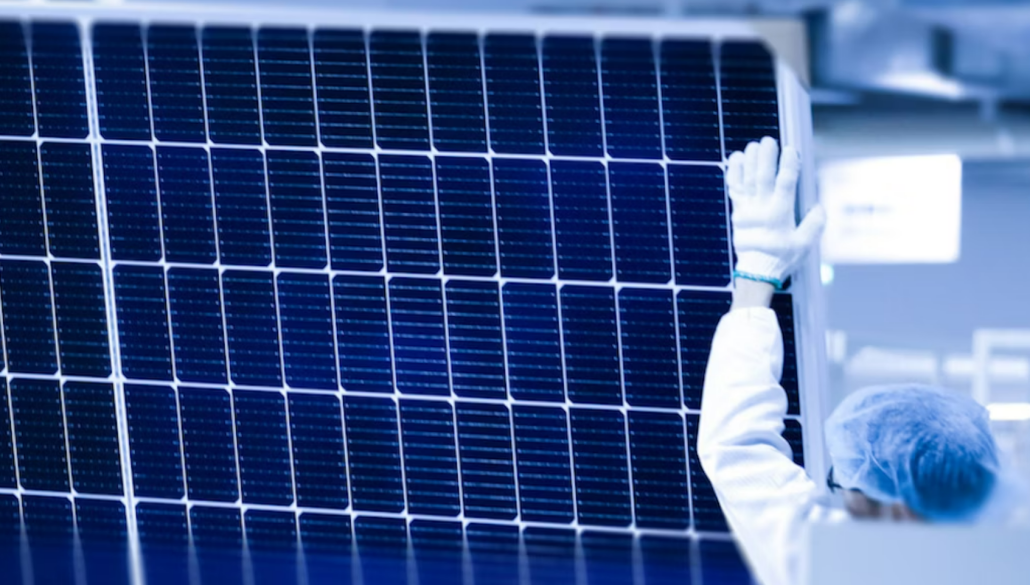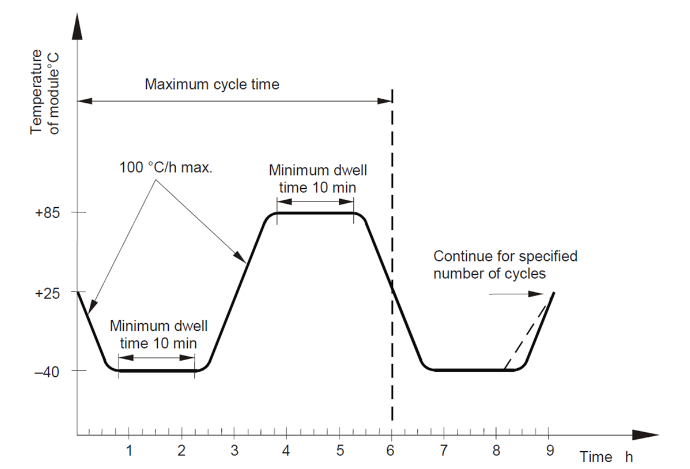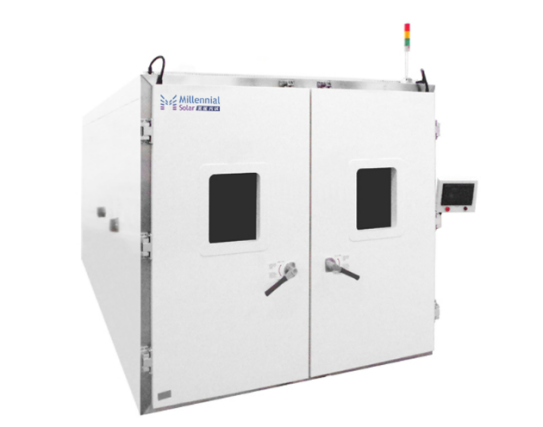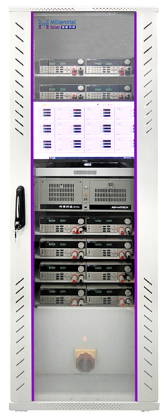
Quantum Efficiency Tester
PL/EL Integrated System
PV-Reflectumeter
3D Confocal Microscope
In-Line Four Point Probe Tester
Four Point Probe Tester
In-Line Thin Film Thickness Tester
Raman Spectrometer
FTIR Spectrometer
Spectrophotometer
Automatic Spectroscopic Ellipsometer
Contact Resistance Tester
Ultra depth of field 3D microscope
Auto Visual Tester
VMM PV Vision Measuring Machine
Solar Cell Horizontal Tensile Tester
Steady State Solar Simulator for Solar Cell
Solar Cell UV Aging Test Chamber
Solar Cell Comprehensive Tensile Tester
Visual Inspection Tester
Wet Leakage Current Tester
PV Module EL Tester
PV Module UV Preconditioning Chamber
Steady State Solar Simulator for PV Module
Current Continuous Monitor
Potential Induced Degradation Test
Bypass Diode Tester
LeTID Test System
Reverse Current Overload Tester
Impulse Voltage Tester
Hipot Insulation Tester
Ground Continuity Tester
Hipot Insulation Ground Tester
Damp Heat Test Chamber
Humidity Freeze Test
Thermal Cycle Test Chamber
Dynamic Mechanical Load Tester
Static Mechanical Load Tester
Hail Impact Tester
Robustness of Termination Tester
Module Breakage Tester
Cut Susceptibility Tester
Peel Shear Strength Tester
Universal Testing Machine (Single-arm)
Universal Testing Machine (Double-arm)
Glass Transmittance Tester
Acetic Acid Test Chamber
EVA Degree of Crosslinking Test System
Junction Box Comprehensive Tester
Drop ball tester
Semi-automatic scanning four-probe tester
Stylus Profilometer
Maximum Power Point Tracker
Perovskite Glass Transmittance Tester
Perovskite P1 Laser Scribing Multifunctional Testing Machine
Perovskite Online PL Tester
Perovskite Online Sheet Resistance Tester
Online Perovskite Film Thickness Tester
Perovskite Process Inspection Workstation
Portable IV Curve Tester
Portable EL Tester
Portable Thermal Imaging Tester
Solar Module Multi-Channel Testing System
PV Inverter Power Quality Tester
Drone EL Tester
IV Tester
IVEL Cell Sorting Machine
Thermal Cycling Test Chamber - The Key to Reliability and Durability
Date : 22 December 2023Views : 1540
The reliability and durability of photovoltaic modules are critical to the long-term performance of solar power systems. In order to evaluate the stability of photovoltaic modules in a temperature changing environment, the International Electrotechnical Commission IEC formulated the IEC 61215 and IEC 61730 standards, which require thermal cycle tests. The Thermal Cycling Test Chamber from Millennial Solar, as a key equipment for evaluating the performance of photovoltaic modules, provides scientific basis for the design and operation of photovoltaic systems.

![]()
What is thermal cycle testing?
By simulating temperature changes in the actual environment, the performance of photovoltaic modules under different temperature conditions can be evaluated, including electrical properties, mechanical properties, and appearance changes. Thermal cycle testing is to determine the ability of photovoltaic modules to withstand thermal mismatch, fatigue, etc. caused by repeated changes in temperature. This test is very important for the reliability of the electrical connections within the module.
The process of thermal cycle testing is to cycle the temperature of the photovoltaic module between (-40±2)℃ and (85±2)℃. The temperature change rate does not exceed 100℃/hour. Under the two extreme temperatures, it should be maintained at least 10 minutes. A cycle time generally does not exceed 6 hours, and 200 cycles are generally tested. Thermal cycle testing can help detect whether photovoltaic modules can withstand the stress caused by temperature changes, as well as their reliability and durability in long-term operation.

Thermal cycle test test process
![]()
Thermal cycle test steps
1. Preparation
2. Install photovoltaic modules: Ensure that the modules to be tested are firmly fixed and in good contact with the test box.
3. Set test parameters: set parameters such as temperature range, temperature change rate, and number of cycles.
4. Conduct the test: Start the thermal cycle test chamber to allow the photovoltaic modules to cyclically heat and cool within the set temperature range.
5. Data collection and recording: Record temperature changes, electrical performance changes, appearance changes and other data during the test process.
6. Data analysis and evaluation: Evaluate the stability and reliability of photovoltaic modules to determine whether they meet the requirements of MQT11 (thermal cycle test) and IEC 61730-MST51 (temperature cycle test) in IEC 61215.
7. Conclusion and report
![]()
Thermal Cycling Test Chamber

E-mail:market@millennialsolar.cn
Introduce:
The Thermal Cycling Test Chamber can verify and evaluate the reliability of photovoltaic modules or materials, and identify manufacturing defects early through thermal fatigue-induced failure modes.
Fulfill the standard:
IEC61215-MQT11 (thermal cycle test); IEC61730-MST51 (temperature cycle test); requirements for equipment testing by third parties such as CNAS, TUV, and UL
Features:
Heating and cooling rate: -40℃←→+85℃, linear 3.3℃/min (heating and cooling rate 0~3.3℃/min adjustable)
Average power consumption: ≤100 KW·h (TC200 single cycle power consumption)
Reliability: Continuous trouble-free operation for no less than 4 months without downtime
Thermal Cycling Test Chamber is used with Current Continuity Testing System

E-mail:market@millennialsolar.cn
Current Continuity Testing System is specially developed for the 10.11 High and Low Temperature Cycle Test Clauses and 10.12 Humidity and Freeze Test Clauses in the IEC61215 standard. Used in conjunction with Thermal Cycling Test Chamber, it can monitor the internal circuit continuity of multiple photovoltaic modules. Determine the fatigue resistance of the material, the rationality of the lamination process, and the stability of the welding quality of the solar cell module in high and low temperature alternating environments.
Thermal cycle testing of photovoltaic modules is an important step to ensure the reliability and durability of photovoltaic systems. By conducting thermal cycle tests and following the IEC 61215 and IEC 61730 standards, we can ensure that the quality and reliability of photovoltaic modules meet international standards. The Thermal Cycling Test Chamber from Millennial Solar is a key equipment for evaluating the temperature resistance performance of photovoltaic modules and plays an important role in practical applications. In the future, with the continuous development of technology, the Thermal Cycling Test Chamber will be further improved to provide more reliable support for the sustainable development of the photovoltaic industry.

































































